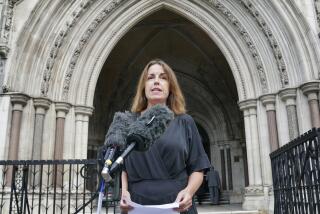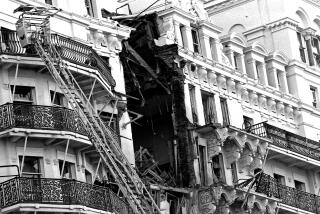Britain Jolted by Its Soldiers’ Deaths
- Share via
LONDON — It was Britain’s “Black Hawk Down,” the moment when a nation’s optimism about its military presence in a foreign country proved to be nothing more than wishful thinking.
The killing Tuesday of six British soldiers by Iraqi civilians shocked a British public lulled into believing that its friendly approach to occupation provided protection against the type of violence that has daily harassed American troops and their other allies.
British complacency ended with the blasts that killed six Royal Military Police officers trying to provide training to a local Iraqi police force. They were overrun by an infuriated crowd in Majar Kabir, a town few in Britain had ever heard of, but which many now fear may be the place that marks where the mission in Iraq went wrong.
“The scary thing is there is really no reference point for what’s happening,” says Andy Arkell, a former British infantry officer who served in Northern Ireland and now writes on defense issues. “Is this Belfast? Is it Vietnam? The truth is, no, it’s not. It is turning into Iraq 2003, and none of us, no matter what anyone says, know what’s going to happen.”
As uneasy as they had been about the war in principle, the British had been convinced that their troops were slowly winning over the Iraqis in the aftermath. While the Americans might be having fits with hit-and-run enemies in one part of the country, conventional wisdom said the British troops’ “softly, softly” approach of patrolling in berets and even on bicycles was making friends among the local population in their sector.
“The troops hadn’t had much trouble up to this week,” says Lawrence Freedman, a professor of war studies at King’s College in London, noting that the British inherited control over a largely Shiite Muslim population that was opposed to Saddam Hussein from the start. At home in Britain, Freedman said, “we started to believe things in Iraq were calming down.”
Media Coverage
The sanguine mood was abetted by media coverage that found an easy narrative for postwar Iraq: “Cowboy” American soldiers are shooting first and asking questions later, the promised humanitarian aid has not been forthcoming, but “our boys” are diligently observing local customs and Muslim sensitivities. Normality is coming, if much too slowly.
That consensus was so strong that when the first reports of Tuesday’s attacks reached Britain, they were delivered in a tone reflecting surprise that such violence could occur in a place that most everyone believed was fully in step with the British program.
Reports from Majar Kabir quickly revealed that, well before Tuesday’s killing, there had been deep unhappiness with British tactics for disarming people of their heavier weapons. It is still uncertain exactly what triggered the violence. But there was clearly existing resentment over British soldiers’ intrusion into homes in their search for weapons.
Among other things, local Iraqis protested that the British troops were using dogs to search for weapons, despite the fact Muslims regard dogs as dirty and do not want them in their homes. The British Defense Ministry says it does use sniffer dogs in Iraq but denied that canines were sent into homes in Majar Kabir.
But clearly the British were a long way from having good relations with the community. Observers who have traveled in the British sector recently say suggestions that the Iraqis regarded the occupation as benign are wrong.
A British member of Parliament who visited Iraq two weeks ago said he was met by two demonstrations in the southern city of Basra the first day he was there.
“There was frustration on the ground across the board, over the lack of water, the lack of electricity, the lack of law and order,” says lawmaker Richard Younger-Ross, a Liberal Democrat with an interest in Iraq that dates to a visit in the early 1980s.
“Something like this was bound to happen. We’ve seen what’s going on in Baghdad, and we’ve been fooling ourselves.”
Others point to even blunter warnings of violence that were missed.
Dominic Nutt, an emergencies officer with the Christian Aid charity, traveled to Majar Kabir at the end of May and was warned by local leader Abu Hatim that impatience over the lack of basic services was growing.
“Abu Hatim told me: ‘We’ll start by throwing stones, and in a month we’ll be throwing bombs,’ ” Nutt recalled.
“Our troops were good, but we’ve raised expectations, and we either have to meet them or lower them.
“And at home we still have this complacent view that they’re not going to shoot at our good old British chaps.”
The reaction to the killings has been part confusion, part outrage. The tabloid press has demanded revenge, calling for the killers to be “hunted down.” Other voices have demanded that more troops be deployed to Iraq.
Damaged Credibility
But Prime Minister Tony Blair is reluctant to commit more soldiers to a force that already numbers 14,000. Blair is hobbled by his own damaged credibility at the moment, stemming from the failure to turn up any weapons of mass destruction in Iraq -- his declared reason for sending British troops into Iraq in the first place.
“People are saying if Blair can’t turn up any concrete evidence of these weapons, then why are we sending our boys to get into these Wild West skirmishes?” said James Gray, a lawmaker from the opposition Conservative Party.
More to Read
Sign up for Essential California
The most important California stories and recommendations in your inbox every morning.
You may occasionally receive promotional content from the Los Angeles Times.













